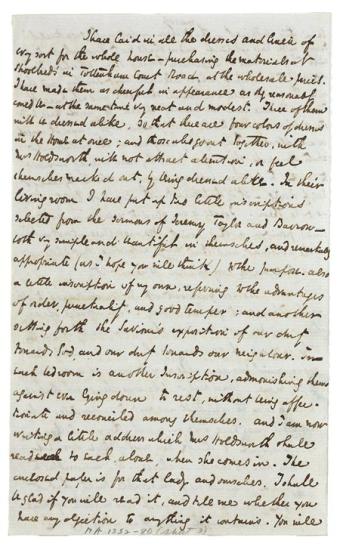
Autograph letter signed, London, 3 November 1847, to Angela Burdett-Coutts
Purchased with the assistance of the Fellows, 1951
Dickens's letters to Burdett-Coutts are, by any standard, extremely long and detailed and reveal his extraordinarily competent administrative abilities as well as shrewd insight into the minds and motivations of the women who would enter Urania Cottage. He insisted "that their past lives should never be referred to." He also recognized "that these unfortunate creatures are to be tempted to virtue. They cannot be dragged, driven, or frightened." Dickens's meticulous attention to detail is apparent in this letter, in which he informs Burdett-Coutts that "I have laid in all the dresses and linen of every sort for the whole house... I have made them as cheerful in appearance as they reasonably could be—at the same time very neat and modest."
Philanthropy
From 1840 Dickens guided the charitable work of philanthropist Angela Burdett-Coutts (1814–1906), the wealthiest heiress in Victorian Britain. Dickens served as her official almoner and helped to assess the merits of the thousands of letters she received from those seeking financial assistance. He also advised on her plan for improved sanitation in the slums of Westminster and drew her attention and support to the Ragged School Union, which provided education to London's poorest children. A pragmatist, Dickens encouraged Burdett-Coutts to direct her philanthropy toward the causes of distress. In 1847 they founded a home, Urania Cottage, in Shepherd's Bush, as a shelter for homeless women—prostitutes or petty criminals who sought to rehabilitate themselves by learning practical skills and developing self-discipline. Many of the women were assisted to eventually emigrate to one of Britain's colonies to begin a new life. For more than ten years, Dickens administered Urania Cottage on behalf of Burdett-Coutts and played an extremely active role in its day-to-day management.
I have laid in all the dresses and linen of every sort for the whole house—purchasing the materials at Shoolbred's in Tottenham Court Road, at the wholesale prices. I have made them as cheerful in appearance as they reasonably could be—at the same time very neat and modest. Three of them will be dressed alike, so that there are four colors of dresses in the Home at once; and those who go out together, with Mrs. Holdsworth, will not attract attention, or feel themselves marked out, by being dressed alike. In their living room I have put up two little inscriptions selected from the sermons of Jeremy Taylor and Barrow—both very simple and beautiful in themselves, and remarkably appropriate (as I hope you will think) to the purpose. Also a little inscription of my own, referring to the advantages of order, punctuality, and good temper; and another setting forth the Saviour's exposition of our duty towards God, and our duty towards our neighbour. In each bedroom is another Inscription, admonishing them against ever lying down to rest, without being affectionate and reconciled among themselves. And I am now writing a little address which Mrs. Holdsworth shall read to each, alone, when she comes in. The enclosed paper is for that lady and ourselves. I shall be glad if you will read it, and tell me whether you have any objection to anything it contains. You will
